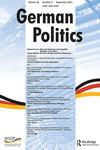Framing COVID-19: Public Leadership and Crisis Communication By Chancellor Angela Merkel During the Pandemic in 2020
IF 1.9
3区 社会学
Q2 POLITICAL SCIENCE
引用次数: 5
Abstract
While communication generally embodies an essential part of public leadership, this is even more true in times of crisis when uncertainty prevails, and the public expects the leader not only to take adequate measures to mitigate the crisis, but also to justify and explain these measures. In the COVID-19 pandemic, Angela Merkel’s communication differed from other Western political leaders who strongly relied on a war narrative. This paper focuses on the framing by the German Chancellor during the first phase of the COVID-19 pandemic (March–July 2020). We examine Merkel’s crisis communication in three different public arenas: her public speeches, her press conference appearances and her weekly podcasts. Based on a qualitative content analysis, our study provides three relevant insights. First, it proves that the claim for solidarity – national as well as European solidarity - represents the crucial element of Merkel’s meaning-making narrative. Second, the study shows that both statements on the protection of public health and of economy strongly resonate in her communication, but that the prioritisation shifted over time. Finally, our analysis manifests how Merkel’s framing differs in the three communicative arenas. Additionally, our findings indicate that Merkel followed a modified leadership style during the COVID-19 crisis. [ FROM AUTHOR] Copyright of German Politics is the property of Routledge and its content may not be copied or emailed to multiple sites or posted to a listserv without the copyright holder's express written permission. However, users may print, download, or email articles for individual use. This may be abridged. No warranty is given about the accuracy of the copy. Users should refer to the original published version of the material for the full . (Copyright applies to all s.)框架新冠肺炎:2020年疫情期间总理安格拉·默克尔的公共领导力和危机沟通
虽然沟通通常是公共领导的重要组成部分,但在不确定性普遍存在的危机时期更是如此,公众希望领导人不仅要采取充分措施缓解危机,还要证明和解释这些措施的合理性。在新冠肺炎大流行期间,安格拉·默克尔的沟通不同于其他强烈依赖战争叙事的西方政治领导人。本文重点介绍德国总理在新冠肺炎疫情第一阶段(2020年3月至7月)的框架。我们研究了默克尔在三个不同公共场合的危机沟通:她的公开演讲、新闻发布会和每周播客。基于定性内容分析,我们的研究提供了三个相关的见解。首先,它证明了团结的主张——国家和欧洲的团结——代表了默克尔意义陈述的关键元素。其次,研究表明,关于保护公共健康和经济的声明在她的沟通中都引起了强烈共鸣,但随着时间的推移,优先顺序发生了变化。最后,我们的分析显示了默克尔的框架在三个沟通领域的不同。此外,我们的研究结果表明,默克尔在新冠肺炎危机期间遵循了一种改良的领导风格。[发件人]《德国政治》版权归劳特利奇所有,未经版权持有人明确书面许可,不得将其内容复制或通过电子邮件发送到多个网站或发布到listserv。但是,用户可以打印、下载或通过电子邮件发送文章供个人使用。这可能会被删节。对复印件的准确性不作任何保证。用户应参考材料的原始发布版本以获取完整信息。(版权适用于所有人。)
本文章由计算机程序翻译,如有差异,请以英文原文为准。
求助全文
约1分钟内获得全文
求助全文

 求助内容:
求助内容: 应助结果提醒方式:
应助结果提醒方式:


